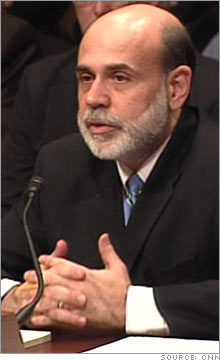Bernanke: Subprime hit could top $100BHousing slump could hurt consumer spending; Fed is moving to protect consumers from predatory mortgage lending.NEW YORK (CNNMoney.com) -- Losses in the fast-unraveling subprime lending market could top $100 billion, but the Federal Reserve is taking measures to protect borrowers, according to Fed Chairman Ben Bernanke. "The credit losses associated with subprime have come to light and they are fairly significant," Bernanke told the Senate Banking Committee in a second day of testimony on the Fed's twice-yearly economic report. "Some estimates are in the order of between $50 billion and $100 billion of losses associated with subprime credit problems," he said, referring to a segment of the mortgage market that caters to borrowers with shaky credit. Defaults on mortgages in the subprime sector have risen sharply in the last few months, resulting in the implosion of several subprime mortgage lenders and funds that bought the repackaged debt. Investors fear more banks and funds will get caught holding bad loans, creating problems across the broader economy. Bernanke said that the most reliable indicators show U.S. home prices have not declined nationally and that the housing slump had so far not led U.S. consumers to cut back on spending. He said, however, that if prices did drop, consumers might trim spending by as much as 9 cents for each dollar of wealth lost. As a result of the weaker-than-expected housing sector, the Fed has lowered its growth forecasts for this year and next, but the U.S. central bank believes the drag should ease over time. Bernanke outlined steps the Fed has taken or plans to take to ensure that the subprime problems do not recur, but sharp questions from members of the committee showed some lawmakers think the Fed was not acting swiftly enough as foreclosure rates soar. "I'm wondering if the actions reflect the crisis at hand," said Robert Menendez, D-NJ, "I'm not convinced the proposals the Fed has put forward are enough to stop predatory lending." In testimony before lawmakers in the House of Representatives on Wednesday, Bernanke had said that licensing mortgage brokers could be a good idea and he promised to institute new rules on mortgage loans within six months that would make the terms of the loan easier for people to understand. When the time frame of when the new rules would take effect was questioned, Bernanke said the Fed was moving as fast as procedure would allow, adding "if you feel the regulatory process is too slow, my only advice is for the Congress to act directly." The Fed chief also faced pointed questioning over China's currency policy as U.S. lawmakers argue that China keeps the value of its yuan currency artificially low to gain an edge for its producers in international markets. The committee's chairman, Democratic Sen. Christopher Dodd of Connecticut, said the panel planned to vote on a bill that could push the U.S. Treasury to declare China a currency manipulator before lawmakers leave Washington for an August recess. Bernanke said he shared the frustration over China's slow progress in allowing the yuan to appreciate, but added that exchange rates alone would not solve an imbalance that has seen the U.S. trade gap with China balloon to new record highs. The weak currency distorts China's economy in favor of exports, Bernanke said, but he added that the yuan regime was not a "subsidy" in the legal sense of the word. Last December, Bernanke caused a stir when he wrote in a speech that the undervalued yuan provided an effective subsidy to Chinese exporters. He stood by that statement under questioning from Congress in February. He was also asked if the booming hedge fund and private equity sectors posed dangers to the economy and should regulated or taxed more heavily. In an effort to remain nonpartisan, he largely sidestepped the tax question. He did note how international private money funds have become and how easy it would be for them to move overseas and still buy U.S. companies. He said these funds do help disperse investment risk and play an important role in ridding companies of poorly performing management. Bernanke's prepared remarks were unchanged from those he gave to the House on Tuesday. In them, he said the economy was growing at a modest rate in 2007 and should expand at a slightly faster rate of perhaps 3 percent in 2008. But Bernanke warned that the decline in the housing market, as well as rising energy prices, are threats to the economy and therefore the Fed needed to continue focus on inflation over job creation in its dual mandate to control prices and create jobs. As the economy slows and the housing market slumps, some have pressured the Fed to cut interest rates as a means of spurring growth. But the Fed has so far refused, leaving rates at 5.25 percent for over a year. Bernanke's testimony did not seem to indicate a cut in the Fed's fund rate was coming, and the stock market declined Tuesday after his speech. The Fed's fund rate, an overnight rate the central bank charges commercial banks, affects everything from corporate borrowing rates to interest on credit card debt. - from staff and wire reports A previous version of this story incorrectly attributed a quotation to Sen. Mel Martinez (R-Fla.). It was Sen. Robert Menendez (D-NJ) who made the statement. CNNMoney.com regrets the error. |
| ||||



